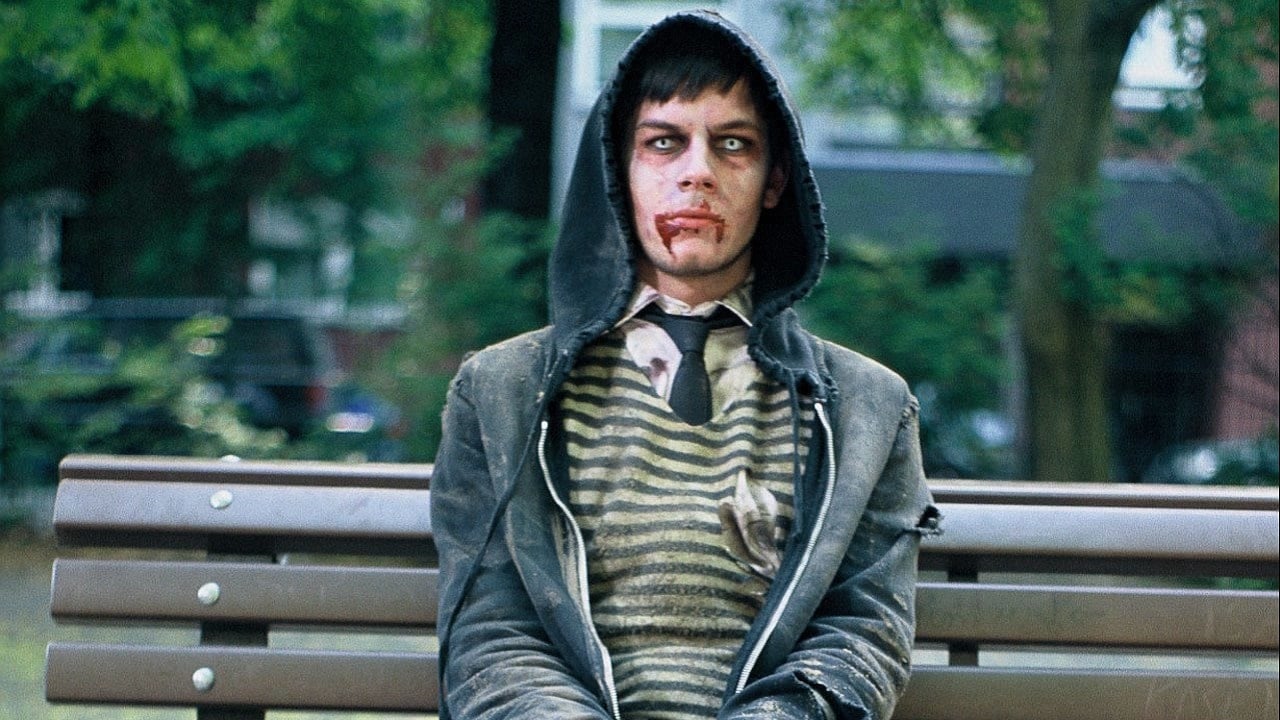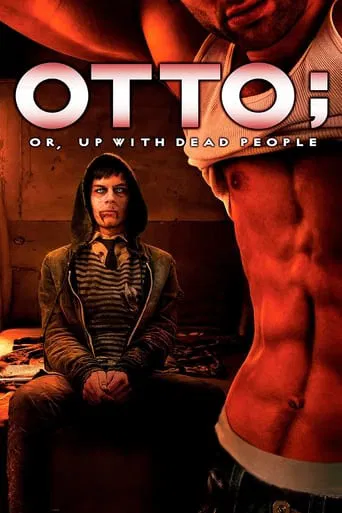

Desperate to cast someone with real talent, a female director hires a young man who believes that he is actually a zombie to play a zombie in this offbeat blend of comedy and horror from cult director Bruce LaBruce. Constantly cutting back and forth between 'reality' and the film-within, 'Otto' is not the easiest film to get into, but it features a large amount of smart and witty dialogue, both as the title character contemplates the advantages of being dead and as the director rambles on about the importance that she perceives her film to have as "a political film" tied to LGBT issues with a "gay plague" that turns all of the zombies homosexual upon returning from the dead (!). This is a creative movie beyond just the film within though with silent movie footage used well and even a fitting animated sequence amid the madness. The film's best asset though is its ambiguity as to whether or not Otto is actually a zombie. When all is revealed, it is a pretty sad film too about how certain experiences can make one feel dead on the inside. It is an up and down ride, with certain sequences (the director screening all of her previous films; some of the love scenes) that drag on for far too long, but the film circles around a character to whom it is surprisingly easy to grow emotionally invested with considering that he wears a singular zombie expression throughout.
... View MoreLaBruce, makes an attempt at being edgy, ironic, and satirical but what he delivers is an uninspired, poorly written, poorly acted, poorly edited waste of time.Firstly, I don't know what's more offensive The fact that LaBruce exploits the struggle for LGBT rights, by using it as an obvious crutch to deflect criticism of his depictions of vile and unconscionable acts of violence and necrophilia, or how badly he misses the mark and twists what could have been a brilliant metaphor, into something you could imagine being shown in the basement of the Providence Road Baptist Church. Then again, it could be his sad attempt at a parody of post-modern nihilism, which also shows not a spark of insight, and instead of skewering the genre, he just parrots it.Whatever his intent, LaBruce misses irony by miles and wouldn't know satire if Groucho Marx shoved a copy of Huckleberry Finn straight up the orifice from which he originally pulled the screenplay for this film.His ironic metaphor, to take mainstream societies rejection of homosexuality and place it parallel to the gristly abomination that zombies represent in fiction; *could* have been brilliant, but his half-hearted effort lets it fall flat and as dead as his protagonist. The real horror here is the result of LaBruce's failure to show any irony at all in this metaphor, or prove it false. Instead, he actually drains all the humanity out of his story and actors, the very characteristic that would give lie to the idea that homosexuals are monstrous abominations that defile human flesh, what's more, he adds fuel to the stereotype by having his characters devalue, exploit, and abuse one another casually.One may be tempted to forgive LaBruce, his blatant exploitation, since this film is a excuse for pornography, disguised as social commentary, disguised as art. It could even be ignored that LaBruce feels free to dispense with the character development, continuity of plot, dialog, humor, or even context that might make this movie bearable that is, if this really was pornography but even at that LaBruce fails miserably.What's more tedious than watching some lifeless derivative piece of art house drivel? Why, it's watching an *insincere* rendition of that same lifeless derivative piece of art house drivel; where only the most obtuse and predictable observations are made as satire and then we are expected to find them profound and witty. LaBruce attempts to mock the genre but does so in such an artless way he becomes part of it. Like two mimes pretending to be mirror images of one another only that's not the best description, because the mimes may accidentally entertain you unlike this film.I would recommend this film to anyone who has survived the zombie apocalypse in actual fact. After mankind is wiped out and all his works have fallen to ruin, watching this film would ease the sense of loss. One could shrug and say "the culture that produced this is dead and gone good riddance." Think you Mr. LaBruce, for giving us all just one more reason to be ashamed of humanity. Well done.
... View MoreIn short, this movie is just as odd as its premise makes it sound. A young homosexual zombie wandering around, isn't exactly a premise for an everyday movie but then again "Otto; or, Up with Dead People" isn't your average everyday movie. It's something unique and original and you will most likely either love it or hate it. Me personally; I quite liked it.Above all things, this is a movie that is taking a very artistic approach. Watching this is a true special experience. Visually its a great looking movie, that is being quite creative and seemed to be full with great ideas. Now, granted that not everything works out well or interesting but overall "Otto; or, Up with Dead People" remains a good watch throughout.You shouldn't take everything in this movie too literally. Seems to me that its entire main concept was a metaphor how lots of people still look upon homosexuals and how they treat them. In lots of places they are still being seen as not normal, to put it mildly and as meat 'eating' animals. That's why the main character of the movie feels like- or thinks he is a freak, or a zombie in this case. At least that's how I interpret things. But who knows, maybe you will get something totally different out of this movie. But fact remains that this is a very homosexual orientated movie and everything revolves around this.This also means that the movie is not just showing kissing men but also some far more explicit moments. There is a fair amount of male nudity and even a couple of graphic sex sequences, involving male characters.The entire movie was obviously quite cheap to make but I think that director Bruce La Bruce did a great job with his material. The way he shot the movie makes it almost irrelevant that it has a quite cheap look to it. It's directed with lots of class, which often makes the movie a visually great one to experience.Don't watch this movie expecting a lot of story though. There isn't really a clear main point to the movie and the movie is more about its underlying messages. Some movies however can do just fine without a clear main story, as this greatly artistic- and as such an effective, movie demonstrates.Still some stuff just remains too odd and distracting. Such as for instance the fact that basically every character the main characters comes across turns out to be an homosexual, male of female. Seriously, what kind of world was this movie supposed to be set in, since you clearly can't call it a realistic one.It also seems odd that this is a German movie, with mostly German actors, speaking all in English. Don't know what's the entire story behind this but it just seems to me that it's more easy for Bruce La Bruce to make movies in Germany but he still wants to reach an international audience, so he wrote and shot all of the dialog in English. This means you can hear a lot of thick accents throughout the movie.Call me weird but I for most part quite liked this movie!7/10 http://bobafett1138.blogspot.com/
... View MoreA very "different" zombie movie. I mean, this could have been a critically acclaimed one if not for the downpour of gay porn in every other scene!The idea of a zombie with tender feelings & thoughts are all nice but all that eating of body parts and graphic gay sex almost made me puke. They could have been done more aesthetically. And too much talking! The female director(actor Katharina Klewinghaus) yaks, yaks & yaks to glory.Nothing special to say about any of the cast. All are average.Verdict: Soft-core gay porn movie. Dead or alive!
... View More